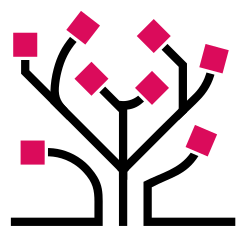the future
of knowledge

Our incubator program is where new use cases around nanopublications can start and grow.
We are looking for individuals interested in:
As part of the incubator program you will receive:
Do I need to be a programmer to apply?
Can I apply as a group or as an organization?
How long do incubator projects run?
Do you have a question that is not listed here?
To apply, send a short paragraph describing your use case, motivation, organization (if applicable), and potential funding opportunities to info@knowledgepixels.com.
Here you find our currently running incubator projects.

by Gertjan Bisschop, VITO
As part of the PARC (Partnership for the Assessment of Risks from Chemicals) consortium, we are developing a FAIR data platform that will help assess the health impact of chemicals. A crucial component of this platform is the management of vocabularies. Since the platform is intended to support ongoing and evolving research from institutes across Europe, we consider dynamic, community-driven vocabulary management to be essential. We believe that nanopublications offer a strong foundation for achieving this goal. Our initial focus will be on the vocabularies associated with the Personal Exposure and Health domain, with the aim of extending this approach to other domains within PARC, encouraging the reuse of the workflows and pipelines we develop.
by Daniel Mietchen, FIZ Karlsruhe
This project uses nanopublications to enhance the sharing of scientific information in a machine-readable fashion and around the research cycle. It tackles practical needs like formally acknowledging contributors, pointing out issues such as broken DOIs, and documenting the state of dynamically changing resources.

by Margreet Bloemers, ZonMw
In this incubator project, we will develop an approach for an integrated analysis of metadata collected with two different, DCAT-AP compliant metadata systems: (1) nanopublication templates of the FAIR Funding Framework (FFF) and (2) the metadata scheme that forms the basis for the National Health Metadata Catalogue (under development in the Netherlands) with metadata on datasets that are available for secondary use. The National Catalogue is a mandatory implementation for the European Health Data Space (EHDS) in each EU-member state. The FFF provides a uniform approach for funders and research organisations aiming to collect reusable (FAIR) information for tracking research outputs and funder activities, using nanopublication-based metadata on components of the (1) funder’s grant procedures, (2) research lifecycles, and (3) tools and services used in research domains. The project aims to deliver a scalable approach for creating rich, machine-actionable information on projects, datasets and other outputs. The approach must facilitate dataset-related metadata to get exposed on the EHDS-National Catalogue. This information can be supplemented with project-related information from FFF nanopublications.

by Erik Schultes, Metabolomics and Analytics Centre (MAC)
Mass spectrometry research confronts challenges endemic to data-intensive science: vendor-specific proprietary formats from multiple Mass Spectrometry instruments, complex multi-consortium governance, and the near-impossibility of tracking provenance across thousands of heterogeneous digital objects spanning clinical samples, instrument logs, processing workflows, and publications. Traditional approaches that retrofit FAIR principles onto existing repositories fail at scale and perpetuate the research integrity and reproducibility crises. This project addresses this systemic failure by implementing nanopublication-based FAIR Digital Objects (FDOs) as minimal, but precise metadata tags at the source, combining automated and human curated machine-actionable assertions that establish unambiguous provenance chains before data enters any workflow. This source-level FAIRification demonstrates that trusted AI in biomedicine requires fundamentally reliable data infrastructure where agentic AI can automatically assess the quality, context, and trustworthiness of every datum from its moment of creation.